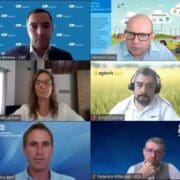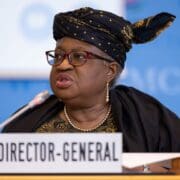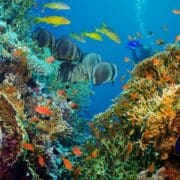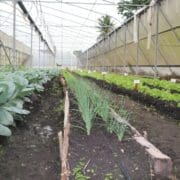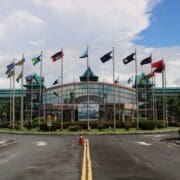Black Immigrant Daily News
By Volker T?rk, UN High Commissioner for Human Rights
Mr President,
Excellencies,
Distinguished delegates,
This Council session focuses on a number of situations that are of particular concern, and we will be delivering statements in relation to country situations throughout this session.[1] This morning and throughout the year I have the opportunity to reflect back to you broader human rights developments, which are by no means exhaustive, that require particular attention, with a view to finding solutions.
Solutions that stem from rights that are universal while being tailored to the specific circumstances of each country. Solutions which bring forward our longstanding experience in difficult settings, and our work as bridge-builders between civil society, human rights defenders and institutions of the State.
Full cooperation with my Office and our field presences – as well as with the various human rights mechanisms – is about just that: solutions. It’s about results. It is not a lightning rod for criticism. And it is not just engagement for engagement’s sake. It’s about concrete results for the lives of people. That kind of cooperation is the mark of a State that honourably seeks to live up to its human rights commitments. Over the course of this year I will provide an update on cooperation, and non-cooperation, with the different human rights mechanisms.
I am aware that discussions of complex human rights issues may be difficult or sensitive, for some. Others may feel they are best whispered behind closed doors. Yet, we need to regain the space where we can discuss them in a constructive and open spirit, undisturbed by the tug of geopolitics and bearing in mind that nobody is perfect. In the spur of the moment you may not like what you hear but over time you may appreciate what we had to say. My only consideration, and in fact my duty, is to stay true to the mandate, the normative human rights framework and the imperative of improving people’s lives.
Mr President,
Contempt for the human being reaches agonizing levels when war breaks out, and violence becomes a daily occurrence.
One quarter of humanity is living today in places affected by conflict, and it is civilians who suffer the most.
Peace is precious and it is fragile – and we must nurture it.
First and foremost, by respecting the Charter of the United Nations and international law, including international human rights law.
The war in Ukraine has led to civilian casualties and destruction of a shocking magnitude. The rights of Ukrainians will be harmed for generations to come, and the war’s impact on fuel and food prices, as well as geopolitical tensions, are impacting negatively on people in every region of the world. That such damage could once again be done across the world by warfare in Europe is a betrayal of the promises of transformative change made at our foundation over 75 years ago. I will be speaking in detail on the situation in Ukraine at the end of March.
Twelve long years of excruciating bloodshed: Syria is a microcosm of the wounds inflicted by utmost contempt for human rights. Last month’s earthquakes have added to this tragedy. The only way forward must be through respect for human rights, and proper accountability of all those who have committed atrocity crimes – both of which Syria has long lacked. I fully support calls for a new institution that is focused on clarifying the fate and whereabouts of missing persons, and providing support to victims, and I urge the Government – as well as other Member States – to cooperate with it, if it is indeed established.
The security situation in Mali is particularly alarming in the central part of the country and the border area between Burkina Faso, Mali and Niger. In this area, numerous armed groups are capitalizing on intercommunal hostility, and the absence of State authorities to expand their influence and carry out attacks against civilians. Armed non-state groups have perpetrated most violations and abuses. Serious violations have also been committed by the Malian Armed Forces, in some instances accompanied by foreign military and security personnel. I am also very worried by hate speech on ethnic grounds, as well as threats, intimidation, and attacks against civil society and media by State and non-state actors, leading to an increasing fear of speaking out. This is particularly concerning given that the country is embarking on an electoral process where a free debate of ideas should flourish.
I am concerned about the prospect of deepening instability in Burkina Faso. Over the last six months of 2022, my Office documented at least 1,076 victims of violations and abuses. That toll almost doubled in the months between October and December, compared to the previous three months. Armed groups are responsible for most of these incidents, but the military’s operations take a growing toll on civilians. I have urged the authorities to listen to the grievances people have regarding impunity, and to investigate such allegations. It is critical to reverse the course of ever-increasing violence, and to allow civil society and political parties to thrive.
In Ethiopia, the welcome implementation of the cessation of hostilities agreement needs to be fully effected, including on transitional justice. I am glad to report that National Consultations on Transitional Justice Policy Options opened yesterday, with the support of my Office; to be followed by consultations across the country with people who have been affected by the conflict. Despite this progress, we have received reports of the continued presence in Tigray of the Amhara Regional Forces and Fano militia, as well as Eritrean Defence Forces, which have reportedly perpetrated very serious violations. There is a clear need for continued monitoring and reporting. There also needs to be tangible progress on accountability regarding conflict-related violations and abuses – including in implementation of the report by my Office and the Ethiopian Human Rights Commission. The human rights situation in other regions of Ethiopia is also of great concern, particularly Oromia.
In addition to Eritrea‘s continued military presence in Tigray, we have received reports that Eritrea is further increasing its use of forced and prolonged conscription, a practice that is akin to enslavement and the main driver of refugee outflows. This needs to be reversed, urgently, for the country to be placed on a path for sustainable development.
In Yemen, the parties need to heed the calls of a population exhausted by eight years of brutal warfare, and move decisively towards a UN-led peace process. For any peace agreement to be durable, transitional justice and accountability are fundamental, and women must be able to participate fully in such talks. Two UN staff members – one from UNESCO and one from my own Office – have been detained for 16 months and must be released at once.
In Libya, widespread violence by armed actors, a longstanding political impasse, and an increasingly restrictive civic space continue to destroy lives and severely harm rights. The Independent Fact-Finding Mission on Libya will present its final report at the end of this session, and it is urgent for the authorities to implement its recommendations without delay.
On Western Sahara, my Office continues remote monitoring of the human rights situation. Given that the most recent visit by the Office took place almost eight years ago, it is crucial for my Office to be able to undertake again meaningful missions to the region.
In recent months, I have had the opportunity to discuss the worrying human rights situation in Kashmir with both India and Pakistan. Progress on human rights, and justice for the past, will be key to advancing security and development. I will continue to explore how my Office can assist, including through meaningful access to the region.
The people of Haiti endure conditions of nightmarish violence. Heavily armed gangs control services and access in large sections of the capital and the country – perpetrating frequent killings, abductions, random sniper attacks and a horrifying level of sexual violence. The situation calls for a combination of responses: turbo-charging the political process towards free and transparent elections; fully implementing the arms embargo; effective sanctions against those who sponsor and direct armed gangs; and international support to build up the capacity of Haiti’s police and judicial systems to fight pervasive impunity and corruption; as well as the deployment of a time-bound specialized support force, with human rights safeguards. We must keep Haiti in our focus, including in support to my Office’s work on the ground.
Mr President,
Discrimination and racism are virulent threats, both to human dignity and to our relationships as human beings. They weaponize contempt. They humiliate and violate human rights, fuelling grievances and despair, and obstructing development.
I am shocked to the core by the contempt for women, and women’s equality, that is spawned across the Internet by some so-called “influencers”, feeding social attitudes that make it possible to ignore, or even condone, gender-based violence, and the pervasive commodification of women.
More generally, the scope and magnitude of discrimination against women and girls makes this one of the most overwhelming human rights violations worldwide, and dismantling it will be a major focus of our work.
The repression of women in Afghanistan is unparalleled, contravening every established belief system. Women and girls’ rights to make choices about their lives and participate in public life have been, or are being, eliminated as we speak. This repression and persecution of women constitute a clenched fist around Afghanistan’s economy and its future. Such a tyranny must not escape accountability. We will not give up; we will continue to fight for respect for the rights and freedoms of every Afghan woman and girl.
In Iran, it is urgent for the authorities to act on the demands of protestors, in particular women and girls, who continue to endure profound discrimination. I remain deeply concerned about 17 protestors who have reportedly been sentenced to death; 4 have been executed so far, and more than 100 currently face charges that carry the death penalty. The recently announced pardons are a welcome first step. I continue to urge the immediate and unconditional release of all those arbitrarily detained in the context of the protests and more generally – including foreign and dual nationals. All Iranians – including all women and girls – must be free to make their own choices, express their views and exercise their rights.
I welcome the new law passed by Sierra Leone in November that prohibits gender discrimination; mandates at least 30 percent women in Parliament, the diplomatic corps, local councils and the civil service; and establishes equal pay for women, among a host of other steps. Many far more wealthy States could learn from this example.
I also welcome Spain‘s adoption last month of legislation to uphold essential sexual and reproductive rights, including by removing restrictions on access to safe abortion. The new measures also address access by all women to assisted reproduction, as well as violence and discrimination based on sexual orientation or gender identity; and they ban so-called “conversion therapies” and the genital mutilation of babies who are born intersex.
Vicious hate speech is not only directed at women and girls, but also people of African descent; Jews; Muslims; LGBTIQ+ people; refugees; migrants; and many other people from minority groups. Deliberate provocations, such as recent incidents of burning the Qu’ran, are intended to drive wedges between communities. And this is dangerous.
The violence that is so disproportionately inflicted on people of African descent by law enforcement officers is an example of the deep structural harm rooted in racial discrimination.
My Office and UN human rights mechanisms have repeatedly highlighted excessive use of force, racial profiling and discriminatory practices by police, most recently in Australia, France, Ireland and the United Kingdom. In Brazil, overall deaths in encounters with police fell in 2021 for the first time in 9 years, with a 31% drop for “white” people, according to one source – but a rise of almost 6% in the number of deaths of Afro-descendants.
In the United States, people of African descent are reportedly almost three times more likely to be killed by police than are “white” people. The brutal death of Tyre Nichols in Memphis two months ago stood out not just because of the severity of the violence caught on tape, but because it was followed by immediate action to prosecute the officers involved, while generally only a fraction of such cases lead to those responsible being brought to justice.
In the US and all other countries, swift and determined action to hold perpetrators accountable in each case should be the rule, not the exception. Structural safeguards must be set up, including independent oversight, effective complaint procedures, and robust legislative reform. But even the strongest actions within law enforcement will not fully succeed unless further concrete steps are taken to address racism and the structures that perpetuate it throughout our societies.
Police forces need to serve and protect everyone in society. In the Philippines, where killings in drug-related police operations still occur, my Office is working with security actors to strengthen accountability and promote human rights in drug enforcement. The Government has announced steps to vet senior police officers for corruption, and I hope there will be rapid progress in prosecuting human rights violators. While I welcome recent acquittals of human rights defenders, there must be an end to other politically motivated charges, and a safer environment for civil society.
Mr President,
Structural injustices, abject poverty and skyrocketing inequalities constitute pervasive human rights failures. I’d like to mention a few examples.
Lebanon is in the throes of one of the worst economic crises in modern history, with more than half of the population now said to be living below the poverty line, and two million people facing food insecurity. Many public sector services have been halted; access to education and healthcare are becoming luxuries; and electricity is scarce. I urge stronger efforts to fight corruption, anchor economic and financial regulation in the rule of law, and firmly embed accountability and transparency into all economic measures. Serious investigation into the explosion of August 2020 is urgently needed, without political interference or further delay.
In Sri Lanka, debilitating debt, and economic crisis, have sharply restricted people’s access to fundamental economic and social rights. Recovery policies will need to redress inequalities, and invest in social protections and other levers of economic resilience. They should also tackle underlying issues of corruption, transparency and accountability in governance, as well as entrenched impunity. The reliance on draconian security laws, as well as the harassment and surveillance of civil society and victims, must end. My Office remains committed to supporting a genuine and comprehensive approach to transitional justice.
Many countries in southern Africa have been hard-hit by successive economic blows, including from COVID-19; rising food, fuel and fertilizer prices due to the war in Ukraine; and spiralling debt repayment. In a region that is the world’s most unequal, these shocks are pushing millions more people into poverty. Surging inflation in Mauritius, for example, has led to unprecedented public protests. Energy shortages have led to severe power cuts in several countries, with negative impact on business, healthcare and water supplies. South Africa last month declared its energy crisis a national state of disaster. At the same time, courts in South Africa are helping to chart a way forward on the legal foundation of economic, social and cultural rights.
While numerous countries in the Global North are also experiencing poverty, people in the United Kingdom are currently experiencing a cost of living crisis that may result in the largest drop in living standards on record. Racial and ethnic minority groups are disproportionately affected. I welcome measures taken by the Government to provide some relief from increased fuel costs and raise the minimum wage, but I encourage more dialogue with striking workers, and with people living in poverty, as well as reforms that advance economic, social and cultural rights.
To face these challenges of structural injustice and inequalities, we need to build economies that build trust in government and advance people’s rights and well-being.
A human rights economy is one in which the aim of advancing human rights informs all national economic, fiscal, monetary, investment and business decisions.
Such national measures will bring immense benefit to millions of people. But they cannot hope to address the global debt emergency that has hit developing countries, in particular, like a runaway train. The impact on their people is crushing hopes and lives.
Dramatically scaled-up financing, as well as reforms of the international financial institutions, are urgently needed to meet these challenges, and my Office will strongly advocate human rights-based change. The Bridgetown Initiative by Barbados stands out for its clear vision of economic justice and new methods for international financing bodies.
Mr President,
Harsh restriction of the civic space is the Achilles heel – the fatal weakness – of governance. If I have one message to deliver to every Head of State or Government it is this: listen to the people – and in particular, to victims and defenders of human rights. These are people who have the deepest experience of these issues, and they have something to say that you need to hear.
I am alarmed by the number and range of countries in which I must report steps that undercut institutions of justice, media freedoms, and the space for fundamental civic freedoms.
Allow me to begin on a positive note.
In Tanzania, progress has been made in opening up civic and democratic space over the past two years. Bans on media outlets and political rallies have been lifted, and reform of restrictive legislation is promised. Tanzania still faces many challenges, and I welcome the President’s commitment to dialogue. More needs to be done to address accountability and other human rights issues, including the Ngorongoro and Loliondo situations.
Zambia has also taken positive steps towards greater respect for human rights and the rule of law. They include numerous amendments and enactments of legislation, among them abolition of the death penalty and removal of provisions that criminalise “defamation of the President”. I look forward to working with the National Mechanism for Reporting and Follow-up, and encourage measures to foster peaceful dialogue between political parties. I also urge both political leaders and the media to back away from increasing polarisation and ethnic division. International financial institutions must recognize that Zambia – like several other countries – urgently needs debt relief to consolidate its progress.
In Kenya, some advances have been made towards accountability for serious human rights violations. I encourage more concrete progress to deliver justice, in line with the Government’s commitments.
Yet, in the Russian Federation, I am deeply concerned by multiple trends. The closures of the newspaper Novaya Gazeta and the Moscow Helsinki Groups are another sign of the demise of Russia’s civic space. Constant pro-war messages on State media feed stereotypes and incite hatred and violence. Over 180 criminal cases have been opened on charges related to alleged defamation of the Armed Forces; those convicted so far include a journalist and a municipal councillor. Since December, any person or entity considered to be “under foreign influence” – an overly wide and vague qualification – can be designated as a “foreign agent” and subjected to numerous restrictions. In December, in a troubling development, legislation prohibiting so-called “propaganda of non-traditional relationships” was extended, to cover information, to anyone, about LGBTIQ+ relationships and sexuality, as well as gender transitioning.
I am also worried by growing agitation against the rights of LGBTIQ+ individuals in many countries, mostly recently in East Africa – including rhetoric by politicians that incites hatred, and crackdowns on LGBTIQ+ organisations. Last week a very troubling draft so-called “Anti-Homosexuality” Bill was tabled in Uganda‘s Parliament, while in Burundi, 24 people were arrested in a crackdown, many of them engaged in AIDS education. It is unthinkable that we are facing such bigotry, prejudice and discrimination in the 21st century, holding back development of all members of society.
In Tajikistan, independent journalists and bloggers have been sentenced to between 7 and 21 years in jail, on charges related to terrorism and extremism, in a deepening crackdown on freedom of expression. The trials were closed, but do not appear to have presented substantial evidence of any crime.
In Bangladesh, I regret the increasing incidence of political violence, coupled with arbitrary arrests of political activists, and ongoing harassment of human rights defenders and media personnel in the build up to the elections this year. Following lengthy consultations with my Office on the Digital Security Act, I urge that it be amended, as criminal sentences continue to be handed down against those exercising their rights to free expression and belief.
In Cambodia, the Government continues to suppress political opposition, human rights defenders and independent media. This has been exemplified by the closure of the Voice of Democracy media outlet and the extraordinarily heavy sentence imposed last week on opposition leader Kem Sokha, on questionable charges. These actions seriously undermine the civic and political space, including the environment for free and fair elections in July.
In Tunisia, I am concerned by recent harsh crackdowns in which judges, media, civil society actors, opposition members and labour leaders have been prosecuted – including before military courts – for allegations that include national security crimes and terrorism. This trajectory of shrinking civic space, and the space for trade unions to defend workers’ rights, must be reversed. More recently, a country-wide wave of arrests and attacks, coupled with dehumanising and racist rhetoric, has targeted migrants, mostly coming from south of the Sahara. I acknowledge the authorities have announced two days ago some measures to support migrants. In addition, I urge full investigation of all attacks, as well as a halt to xenophobic hate speech.
In Egypt, continuing restrictions on civic space include crackdowns on dissent, arbitrary detention, and action to censor and block websites. Lengthy sentences were handed down two days ago to several people carrying out human rights advocacy, in proceedings on questionable terrorism-related charges which also raised fair trial concerns. Building on Egypt’s National Strategy for Human Rights, I urge the authorities to release all those arbitrarily detained, and to lift restrictions on civic space.
In Peru, at least 60 people were killed and over a thousand injured in clashes with security forces and at roadblocks during recent protests. The underlying grievances, including discrimination and exclusion, particularly affect indigenous peoples, rural campesinos and the urban poor. Recent initiatives by the Government, such as the creation of a commission to provide economic support to families of those killed and injured, should be expanded to ensure accountability, truth and full reparation for all victims. My Office is ready to support meaningful dialogue about the underlying issues.
Regarding China, we have opened up channels of communication with a range of actors to follow up on a variety of human rights issues, including the protection of minorities, such as for Tibetans, Uyghurs and other groups. In the Xinjiang region, my Office has documented grave concerns – notably large-scale arbitrary detentions and ongoing family separations – and has made important recommendations that require concrete follow-up. We also have concerns about the severe restrictions of civic space more generally, including the arbitrary detention of human rights defenders and lawyers; and the impact of the National Security Law in Hong Kong.
Mr President,
Combatting climate change and upholding the right to a clean, healthy and sustainable environment are the defining struggles of our generation. Again, I would like to share a few examples.
Somalia is currently enduring a historic drought, with agonizing impact on the lives and rights of millions of people. Last year, almost 1.2 million Somalis left their homes because of lack of rain. Competition among pastoralists for scarce natural resources is a driver of conflict: since 2020 at least 237 people have been killed in clan violence related to land, pasture or water. The situation is exacerbated by the Al-Shabaab armed group, which targets water sources and infrastructure to punish communities perceived to support the Government. In all, a projected 8.3 million people across Somalia are expected to be in acute need of food assistancem or other assistance, between April and June this year.
In the Sahel region, a recent report by my Office outlines the profound impact of climate change-related soil degradation and declining food production on income, health, resource competition, conflict, and displacement – a vicious cycle that now spins deeper with every planting season. Temperatures in the Sahel are rising much faster than the global average; even if the global temperature rise is kept to an unlikely 1.5 degrees, the impact on the people of the Sahel will be permanent and devastating.
Iraq is also suffering profound damage from climate change, with sharply increasing temperatures, less rainfall, and more dust storms. Water flow in the Tigris and Euphrates rivers has decreased by 29 percent and 73 percent respectively, with dam projects in the region an additional factor. According to technical experts at the Second Baghdad Water Conference last year, 7 million Iraqis risk being unable to meet their water needs in the near future. I am also concerned about the shrinking space for free expression in the country.
Pacific Island States and other small island developing countries have led the world in advocating for climate action, including a regional framework to prevent and respond to displacement, which my Office is helping to support. I note in particular Vanuatu‘s initiative to seek an advisory opinion from the International Court of Justice on the obligations of States to protect the rights of present and future generations against the adverse effects of climate change.
Transparent governance is critical, to repair harms and build resilience. Climate finance funds need to reach those most affected and most vulnerable, and they need to build in strong human rights safeguards.
And we must call out fake climate solutions. I deplore the attempts by the fossil fuel industry at global climate talks and elsewhere to greenwash their reputation and derail our goal of decarbonization. This must be averted at the upcoming COP28 in Dubai, and we need inclusive, safe and meaningful participation of civil society.
In every country, I strongly encourage the following. Public access to information on environmental risks and Government policies. Full participation and consultation on environmental laws and measures – notably for indigenous peoples and others who are first in line for climate harms. And protection of those who raise concerns over environmental crimes, or policies that result in harm.
Bashing climate protests; designing laws that unfairly restrict activities that call the public’s attention to climate harms; and allowing attacks on activists to go unpunished: these are tactics that harm all States and all human beings. And they need to be addressed, urgently.
Mr President,
Conflict, discrimination, poverty, restrictions on civic space and the triple planetary crisis.
We face the compounding effects of all these crises – while also confronting a surge of new human rights challenges, notably in the digital realm and involving artificial intelligence and surveillance. Fresh thinking, political leadership, renewed commitments, and dramatically scaled-up financing — with the centrality of human rights at their core — are urgently needed to meet these challenges.
Let us use this year of human rights anniversaries to go the extra mile.
Thank you.
Donate At Caribbean News Service, we do not charge for our content and we want to keep it that way. We are seeking support from individuals and organisations so we can continue our work & develop CNS further.
NewsAmericasNow.com


